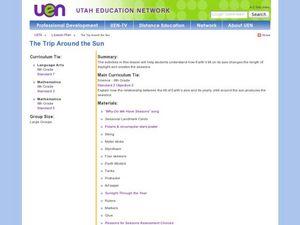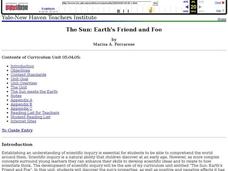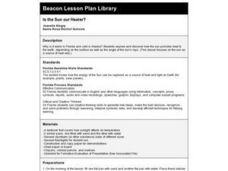Curated OER
The Reasons for the Seasons
Young scientists use a globe and a light to simulate the rotation of the earth and sun to show the seasons. Additionally, they simulate direct sunlight and indirect sunlight showing intensity of the sun, and answer questions based on...
California Academy of Science
Kinesthetic Astronomy: Birthday Stars
Space explorers take a virtual trip around the sun right within your classroom! They stand in a circle facing away from the "sun" (a lamp) in the center of the room. As they move according to your instructions, they view different...
California Academy of Science
Kinesthetic Astronomy: Longer Days, Shorter Nights
A lamp, four globes, and some signs taped around the room are all you need to set up a solar system simulation for teaching how Earth's tilted axis creates the seasons. (Sticky dots are also needed, but not mentioned in the materials...
Curated OER
Galaxy Adventure
Working in groups, learners create a mnemonic device, give an oral presentation, and create a pictorial representation of the correct sequence of the planets and asteroid belt from the sun. An assessment rubric is included in the...
Curated OER
The Four Seasons - Earth's Axis
Students explain that it is the tilt of earth's axis that causes the seasons. They engage in a variety of activities, both teacher-led and on the computer, which enable them to further explain how the Earth's axis affects the seasons.
Curated OER
The Trip Around the Sun
Sixth graders investigate the relationship between the tilt of the Earth's axis and the seasons. For this earth science lesson, 6th graders sing the song "Why Do We Have Seasons" and use simulate the Earth's tilt by using their bodies.
Curated OER
Solar Car Series: During what part of the day can t most Sun power be collected?
Students participate in an outdoor activity in which they make direct but safe observations of the Sun. Students use a solar cell and voltmeter apparatus to collect data on the amount of DC voltage produced by the solar cell during a...
Curated OER
Earth Rotation
Learners examine the rotation of the Earth as it occurs in the 24 hour cycle. They use models of planets and the globe to make observations of movements made. Students brainstorm prior knowledge and then participate in a demonstration of...
Curated OER
Earth, Sun, and Moon
In this identify the part of Earth that is nighttime worksheet, students view sets of pictures of locations of the sun and Earth and shade in the part of Earth which is in darkness. Students shade 6 pictures.
Messenger Education
Star Power! Discovering the Power of Sunlight
It takes less than 10 minutes for energy from the sun to travel 90 million miles to Earth! In the first installment in a series of four, groups measure the amount of solar radiation that reaches Earth. They then discuss how this is...
Curated OER
Seasons Worksheet #1
First, your earth science pupils determine what season is depicted in a diagram of the tilted Earth as it receives radiation from the sun. They answer multiple choice questions about occurrences at different points on Earth in the...
Chicago Botanic Garden
Understanding the Greenhouse Effect
The greenhouse effect is important, for without it, life on Earth would not exist. An activity that includes modeling the greenhouse effect and acting out the Earth's energy balance makes up the first part in a series of seven lessons....
Curated OER
Earth's Water
If the majority of our planet is covered with water, why do we need to bother conserving it? With a thorough and varied investigation into the location and types of water on the earth, learners will gain an understanding of why this...
Curated OER
Timekeeping by the Sun
Students measure shadows to learn about the Sun-Earth relationship. In this astronomy lesson, students create a shadow stick of a Pokemon character and record measurements of its shadow in a data chart. Follow-up discussions guide...
Curated OER
Hello Sun, Goodnight Moon
Students become familiar with different times around the world through the reading of 9 O'clock Lullaby. In this Earth, sun, moon lesson, students recognize the movement of the Earth and the relationship to the sun and the moon. ...
Curated OER
The Sun: Earth's Friend and Foe
Students study the structure and features of the sun. In this earth science lesson, students explain how the sun's energy drive the processes on Earth. They perform temperature conversions using appropriate equations.
Alabama Learning Exchange
The Sun and the Earth
Third graders study and diagram the positions of the Earth and sun during the four seasons. They predict weather for cities in the northern and southern hemispheres.
Curated OER
Planet Earth
In this Earth worksheet, students review 13 terms associated with the Earth's rotation, revolution, and orbit. Students find the terms in a word search and then fill in the term next to its definition.
Curated OER
Follow the Sun
Students use a simple model of the Earth and Sun as seen from space to explore the sun's apparent movement across the sky over the course of a day and year. They consider the apparent direction of movement and changes in the sun's angle.
Curated OER
The Sun and Moon
Students understand basic concepts about Earth, the Sun and the Moon,
such as relative movement and the phases of the moon. Through discussion, looking at pictures, listening to Native American stories, observing, and building models,...
Curated OER
The Solar System: Go Green with the Sun!
Third graders learn how to use solar power. In this sun, technology and energy lesson, 3rd graders learn how the solar power from the sun can give off energy, learn about solar panels, discuss their uses and benefits, and design a solar...
Curated OER
Stellar Evolution and the Fate of Earth
Eighth graders identify the different stages in the life cycle of a star. In this astronomy lesson, 8th graders read H-R diagrams and analyze data. The describe how the Sun's evolution will affect Earth in the future.
Curated OER
Earth, Sun, and Moon
Students participate in a demonstration and complete an online activity that illustrates the earth orbits the sun once a year, and that the moon takes approximately 28 days to orbit the earth.
Curated OER
IS THE SUN OUR HEATER?
Students explore and discover how the sun provides heat to the earth, depending on the surface as well as the angle of the sun's rays.
Other popular searches
- Earth Moon Sun System
- Earth Sun and Moon
- Earth/sun/moon
- Earth and the Sun
- Earth, Sun and Moon
- Earth and Sun
- Earth Moon Sun
- Earth Rotation Around Sun
- Earth and Moon and Sun
- Earth Orbit the Sun

























